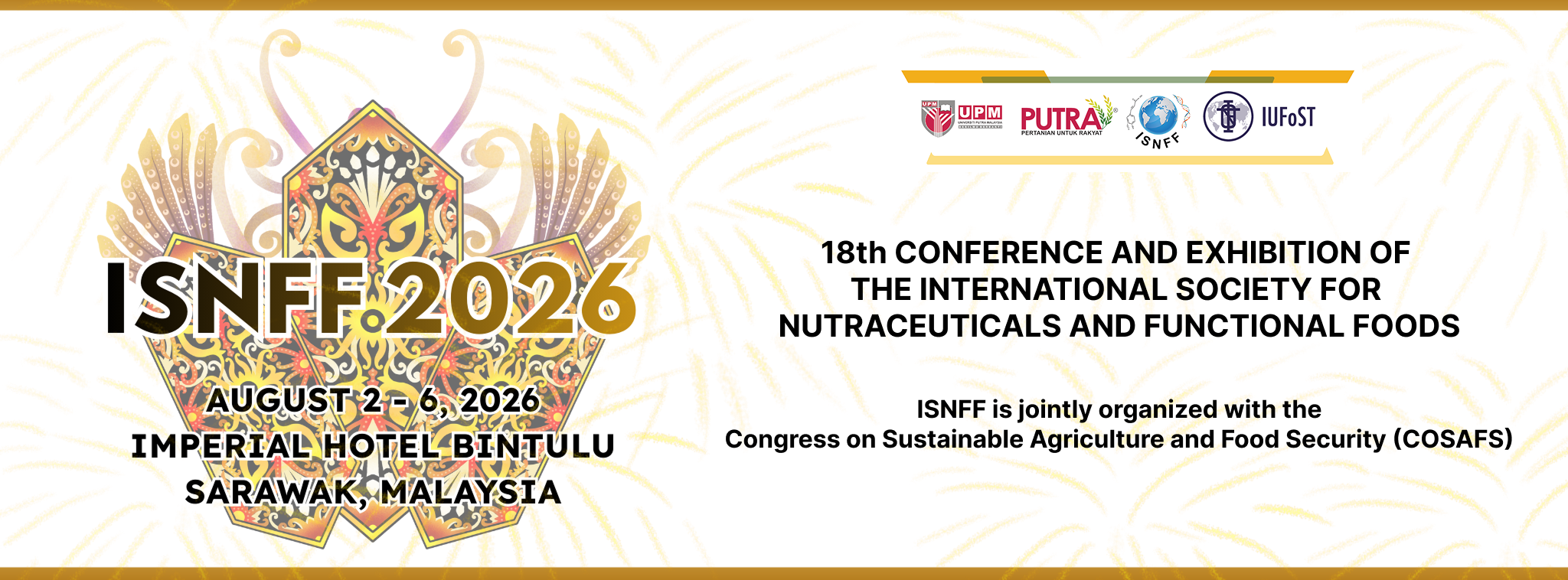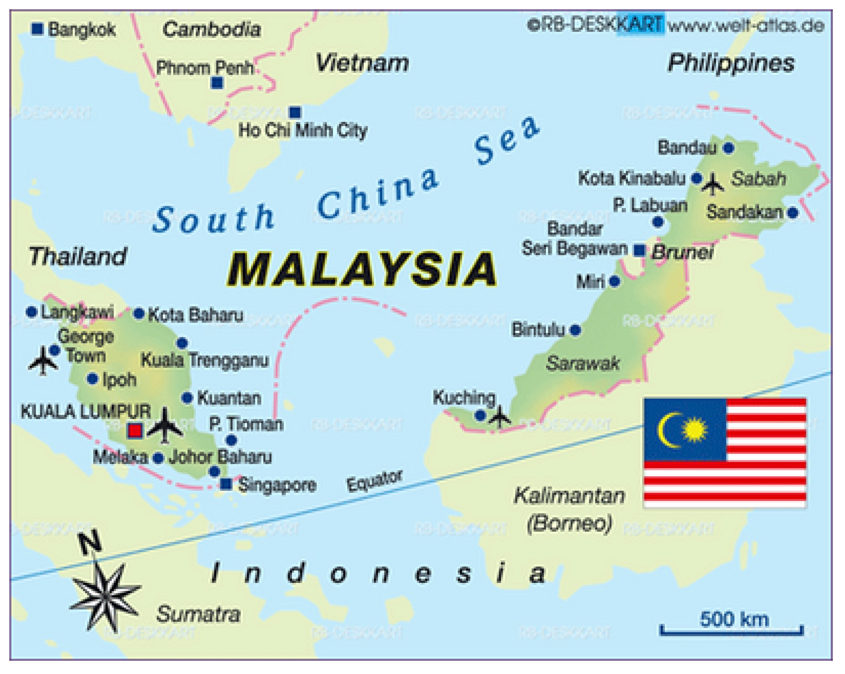
ISNFF 2026 Conference Leaflet
WELCOME TO ISNFF 2026
The 18th International Society for Nutraceuticals and Functional Foods (ISNFF) Conference and Exhibition will be held in Sarawak, Malaysia, jointly with the 3rd Congress on Sustainable Agriculture and Food Security (COSAFS), bringing together leading scientists, industry experts, and policymakers from around the world to share knowledge and discuss recent advances in nutraceuticals, functional foods, sustainable agriculture, and food security.
Since its establishment in 2008, ISNFF has served as a global platform to promote natural health
products, including nutraceuticals, dietary supplements, and functional foods, aiming to improve health and manage disease risk. Over the years, the ISNFF has successfully bridged the gap between the scientific community, healthcare professionals, industry stakeholders, and the public through its international conferences, short courses, newsletters, and other publications. Previous ISNFF conferences have attracted between 400 and 2,000 participants from around the world. The Journal of Functional Foods was its first official journal created by its Founding Editor. Journal of Food Bioactives is serving now as its main publication outlet. <isnff-jfb.com>. ISNFF, as a Disciplinary Interest Group of the International Union of Food Science and Technology (IUFoST), regularly organizes short courses and seminars, sometimes in collaboration with other societies such as the Institute of Food Technologists (IFT) and the American Chemical Society (ACS).
The organizing committee warmly invites participants from academia, industry, and regulatory agencies to join this exceptional opportunity for networking, collaboration, and scientific exchange.
IMPORTANT DATES
Registration/Abstract Submission: January 1, 2026
Abstract Submission Deadline: April 1, 2026
Early-Bird Registration Deadline: June 1, 2026
Regular Registration Deadline: July 1, 2026
Registration details will be available soon at www.isnff.org
For further information, please email to isnffsecretary@gmail.com
REGISTRATION FEES
| INTERNATIONAL | |
|---|---|
| ▸ Early-bird (ISNFF members) | USD 500 |
| ▸ Early-bird (non-members) | USD 600 |
| ▸ Early-bird (ISNFF student members) | USD 250 |
| ▸ Early-bird (student non-members) | USD 300 |
| ▸ Regular (ISNFF members) | USD 600 |
| ▸ Regular (non-members) | USD 700 |
| ▸ Regular (ISNFF student members) | USD 300 |
| ▸ Regular (student non-members) | USD 350 |
| MALAYSIA AND DEVELOPING ASEAN COUNTRIES | |
|---|---|
| ▸ Early-bird (non-students) | RM 1500 |
| ▸ Early-bird (students) | RM 800 |
| ▸ Regular (non-students) | RM 1800 |
| ▸ Regular (students) | RM 1000 |
PAYMENT METHODS
DEVELOPING ASIAN COUNTRIES

MALAYSIA

CONFERENCE TOPICS
Nutraceuticals and Functional Ingredients
- Polyphenols, their metabolites and health effects
- Carotenoids and other natural colorants/pigments
- Proteins, bioactive peptides and amino acids
- Functional lipids, omega 3 oils/supplements, Palm-based products and ingredients
- Antioxidants and oxidation control
Functional Foods and their Health Benefits
- Fruits, vegetables, grains, legumes, nuts, tea, coffee, cocoa, and their health-promoting properties
- Fermented foods, ethnic foods and beverages
- Marine and aqua-cultured products, including seaweed, microalgae and kelp
- Botanicals, spices and herbs: Food, pharmaceuticals and their health effects
Advances in Nutraceuticals and Functional Foods
- Functional carbohydrates, microbiome, prebiotics, probiotics, synbiotics, postbiotics and health implications
- Functional foods and non-communicable diseases (cardiovascular, diabetes, obesity), metabolic syndrome, and other health effects.
- Nutrigenomics, nutrigenetics, personalized and precision nutrition
- AI, and omics in next-generation functional food and nutraceuticals
- Analytical and computational tools, AI, in silico and molecular miideling
Integrative Approaches to Nutraceuticals and Functional Foods
- Controlled-release and delivery of functional ingredients
- Traditional and novel approaches in improving bioavailability of bioactive compounds
- Green techniques for functional foods and nutraceuticals
- Upcycling and zero waste processing of food
- Food formulation, processing, production and ultra-processed foods
- Smart packaging of bioactives and functional food ingredients
- Halal-certified ingredients and processing
- Taste, olfaction and sensory aspects
Palm Oil, Palm Products, and Palm Bioactives
- Palm oil: Composition, usages and its stability
- Palm oil carotenoids, tocotrienols and other bioactives
- Palm products as traditional and novel formulation designs
- Other topics
LOCAL ORGANIZING COMMITTEE FOR ISNFF
| Chair | ▸ Prof. Dr. Amin Ismail, Universiti Putra Malaysia (UPM) |
| Co-Chairs | ▸ Assoc. Prof. Dr. Mohd Redzwan Sabran, UPM ▸ Dr. Kong Kin Weng, University Malaya |
| Secretary | ▸ Dr. Nurul Husna Shafie, UPM ▸ Dr. Siti Raihanah Shafie, UPM |
| Treasurer | ▸ Dr. Suryati Muhammad Alinafiah, UPM ▸ Ms. Safarina Mohamad Ismuddin |
SCIENTIFIC COMMITTEE (LOCAL)
| Chair | ▸ Prof. Ts. Dr. Azrina Azlan, UPM |
| Co-Chairs | ▸ Prof. Dr. Loh Su Peng, UPM ▸ PProf. Dr. Norhaizan Mohd Esa, UPM |
| Secretary | ▸ Dr. Chang Sui Kiat, Universiti Tunku Abdul Rahman (UTAR) ▸ Prof. Dr. Wan Rosli Wan Ishak, Universiti Sains Malaysia (USM) ▸ Dr. Chew Lye Yee, Taylor’s University ▸ Assoc. Prof. Ts. Dr Hasnah Haron, Universiti Kebangsaan Malaysia (UKM) ▸ Prof. Ts. Dr. Wan Aida Wan Mustapha, UKM ▸ Dr. Azizah Othman, Universiti Teknologi MARA (UiTM) ▸ Dr. Emmy Hainida Khairul Ikram, UiTM ▸ Dr. Abbe Maleyki Mhd. Jalil, Universiti Sultan Zainal Abidin (UniSZA) ▸ Dr. Muhammad Hanif Rawi, Universiti Malaysia Sabah (UMS) ▸ Ts. Dr. Mohd Nazri Abdul Rahman, UMS ▸ Dr. Aswir Abd. Rashed, National Institute of Health (NIH) ▸ Mohammad Adi Mohammad Fadzil, IMR ▸ Dr. Hadijah Hassan, Malaysia Agricultural Research and Development Institute (MARDI) ▸ Prof. Dr. Muhammad Ibrahim, International Islamic University Malaysia (IIUM) ▸ Dr. Law Lei Shii, Universiti Malaysia Sarawak (UNIMAS) |
ISNFF CONFERENCE ORGANIZERS
Prof. Dr. Fereidoon Shahidi
Prof. Dr. Amin Ismail
Prof. Dr. Jiangping Wu
Prof. Dr. Cesarettin Alasalvar
Prof. Dr. Ronald B. Pegg
INTERNATIONAL ADVISORY BOARD
▸ Cesarettin Alasalvar (Türkiye)
▸ Rotimi Aluko (Canada)
▸ Nandika Bandara (Canada)
▸ Colin Barrow (Australia)
▸ Bradley Bolling (USA)
▸ Rong Cao (Tsao) (Canada)
▸ Zhen-Yu Chen (Hong Kong)
▸ Adriano C. de Camargo (Chile)
▸ Richard J. Fitzgerald (Ireland)
▸ Chi-Tang Ho (USA)
▸ Charles Hu (USA)
▸ Guangwei Huang (USA)
▸ Amin Ismail (Malaysia)
▸ You-Jin Jeon (Korea)
▸ Bo Jiang (China)
▸ Shiming Li (USA & China)
▸ Kazuo Miyashita (Japan)
▸ Lanh Van Nguyen (Canada)
▸ Aneta Kopec (Poland)
▸ Carmen Lammi (Italy)
▸ Giuseppina Mandalari (Italy)
▸ Jordi Salas-Salvado (Spain)
▸ Shahrul Razid Sarbini (Malaysia)
▸ Muhammad Azmi Mohammed (Malaysia)
▸ Min-Hsiung Pan (Taiwan)
▸ Ronald B. Pegg (USA)
▸ Pingfan Rao (China)
▸ Kenji Sato (Japan)
▸ Fereidoon Shahidi (Canada)
▸ Zhuliang Tan (Canada & China)
▸ Fidel Toldra (Spain)
▸ Rimantas Venskutonis (Lithuania)
▸ Chin-Kun Wang (Taiwan)
▸ Daoying Wang (China)
▸ Jiankang Wang (China)
▸ Hanny Wijaya (Indonesia)
▸ Jianping Wu (Canada)
▸ Gow-Chin Yen (Taiwan)
▸ Liangli Yu (China & USA)
▸ Jerzy Zawistowski (Canada)
▸ Zhenxing Wang (China)
▸ Ardiansyah Michwan (Indonesia)
CONTACT US
Dr. Nurul Husna Shafie
Prof. Dr. Amin Ismail
Prof. Dr. Fereidoon Shahidi

The organizing committee welcomes your participation in Sarawak for our international conferences in August 2026.
This marks the first time ISNFF will be held in Malaysia, with Bintulu, Sarawak selected for its vibrant cultural heritage, breathtaking natural landscapes, and distinctive location on Borneo Island, offering participants a truly memorable experience that blends tradition with nature.
How to get to Bintulu?
Bintulu, an industrial port town of Sarawak, is well connected by direct flights from major Malaysian cities such as Kuala Lumpur, Kuching and Kota Kinabalu. There are frequent daily flights via Kuala Lumpur International Airport, Kuching International Airport and Kota Kinabalu International Airport, making Bintulu a convenient and accessible destination for international travelers.
Please refer to the following websites for access information
Please refer to the following websites for access information

Where to go in Sarawak – discover more by checking out the Sarawak Tourism Board’s website at
https://www.sarawaktourism.com/web/home/index/
The organizing committee looks forward to meeting you in Sarawak





